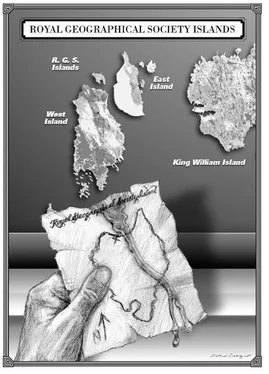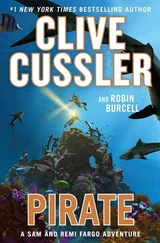“She’s American,” he muttered. The nationality surprised him, as American ships had informally boycotted the passage at the urging of their government. Weber focused the glasses on the ship’s bow, just making out the name ATLANTA in white lettering as the evening light began to fade.
“Her name is the Atlanta ,” he said to Hopkins. The radio operator nodded and tried hailing the ship by name, but there was still no response.
Weber hung the binoculars on a metal hook, then located a binder on the chart table and flipped it open, searching for the name Atlanta on a computer printout. All non-Canadian vessels making a transit of the Northwest Passage were required to file notification with the Coast Guard ninety-six hours in advance. Weber checked to see that his file had been updated by satellite link earlier in the day but still found no reference to the Atlanta .
“Bring us up on her port bow. Hopkins, tell them that they are crossing Canadian territorial waters and order her to stop for boarding and inspection.”
While Hopkins transmitted the message, the helmsman adjusted the ship’s heading, then glanced at the radar screen.
“The channel narrows ahead, sir,” he reported. “Pack ice encroaching on our port beam approximately three kilometers ahead.”
Weber nodded, his eyes still glued to the Atlanta . The merchant ship was moving at a surprisingly fast clip, over fifteen knots, he guessed. As the Coast Guard vessel edged closer, Weber again observed that the ship was riding high on the water. Why would a lightly laden ship be attempting the passage? he wondered.
“One kilometer to intercept,” the helmsman said.
“Come right. Bring us to within a hundred meters,” the captain ordered.
The black merchant ship was oblivious to the Coast Guard patrol craft, or so it seemed to the Canadians. Had they tracked the radar set more closely, they would have noticed that the American ship was both accelerating and subtly changing course.
“Why won’t they respond?” muttered the helmsman, growing weary of Hopkins’s unanswered radio calls.
“We’ll get their attention now,” Weber said. The captain walked to the console and pressed a button that activated the ship’s marine air horn. Two long blasts bellowed from the horn, the deep bray echoing across the water. The blare drew the men on the bridge to silence as they awaited a response. Again, there was none.
There was little more Weber could do. Unlike in the United States, the Canadian Coast Guard was operated as a civilian organization. The Harp ’s crew was not military trained, and the vessel carried no armament.
The helmsman eyed the radar screen and reported, “No reduction in speed. In fact, I think she’s still accelerating. Sir, we’re coming along the ice pack.” Weber detected a sudden urgency in his voice. While focused on the merchant ship, the helmsman had neglected to track the hardened pack ice that now flanked their port side. To starboard, the steaming merchant ship rode just a dozen meters away and had drawn nearly even with the patrol craft.
Weber looked up at the high bridge of the Atlanta and wondered what kind of fool was in command of the ship. Then he noticed the bow of the freighter suddenly veer toward his own vessel and he quickly realized this was no game.
“Hard left rudder,” he screamed.
The last thing anyone expected was for the merchant ship to turn into them, but in an instant the larger vessel was right on top of the Harp . Like a bug under the raised foot of an elephant, the patrol boat madly scrambled to escape a crushing blow. Frantically reacting to Weber’s command, the helmsman jammed the wheel full over and prayed they would slip by the bigger ship. But the Atlanta was too close.
The side hull of the freighter slammed into the Harp with a deep thud. The point of impact came to the boat’s stern, however, as the smaller vessel had nearly turned away. The blow knocked the Harp hard over, nearly capsizing her as a large wave rolled over the deck. In what felt like an eternity to the stricken crew, the Coast Guard craft gradually rolled back upright as it fell away from the bristling sides of the merchant ship. Their peril was not over, however. Unknown to the crew, the collision had torn off the vessel’s rudder. With its propeller still spinning madly, the patrol boat surged straight into the nearby ice pack. The Harp drove several feet into the thick ice before grounding to a sudden halt, flinging the ship’s crew forward.
On the bridge, Weber picked himself up off the deck and helped shut down the vessel’s engine, then quickly assessed the health of his ship and crew. An assortment of cuts and bruises was the worst of the personal injuries, but the patrol boat fared less well. In addition to the lost rudder, the ship’s crumpled bow had compromised the outer hull. The Harp would remain embedded in the ice for four days before a tow could arrive to take the ship to port for repairs.
Wiping away a trickle of blood from a gash on his cheek, Weber stepped to the bridge wing and peered to the west. He saw the running lights of the merchant ship for just a second before the big ship disappeared into a gloomy dark fogbank that stretched across the horizon. Watching as the ship disappeared, Weber shook his head.
“You brazen bastard,” he muttered. “You’ll pay for this.”
* * *
Weber’s words would prove to ring hollow. A fast-moving storm front south of Baffin Island grounded the Canadian Air Command CP-140 Aurora reconnaissance plane called in by the Coast Guard. When the aircraft finally lifted off from its base in Greenwood, Nova Scotia, and arrived over Lancaster Strait, more than six hours had elapsed. Farther west, a Navy icebreaker and another Coast Guard cutter blocked the passage off Prince of Wales Island, waiting for the belligerent freighter to arrive. But the large black ship never appeared.
The Canadian Coast Guard and Air Force scoured the navigable seas around Lancaster Strait for three days in search of the rogue vessel. Every available route west was scrutinized several times over. Yet the American merchant ship was nowhere to be seen. Baffled, the Canadian forces quietly called off the search, leaving Weber and his crew to wonder how the strange ship had somehow disappeared into the Arctic ice.
Dr. Kevin Bue peered at the blackening sky to the west and grimaced. Only hours earlier, the sun had shone brightly and the air was still while the mercury in the thermometer tickled twenty degrees Fahrenheit. But then the barometer had dropped like a stone in a well, accompanied by a gradual building of the westerly winds. A quarter of a mile away, the gray waters of the Arctic now rolled in deep swells that burst against the ragged edge of the ice pack with billowing fountains of spray.
Tugging the hood of his parka tighter, he turned away from the stinging winds and surveyed his home of the last few weeks. Ice Research Lab 7 wouldn’t rate many stars in the Mobil Travel Guide for luxury or comfort. A half dozen prefabricated buildings made up the camp, huddled in a semicircle with their entrances facing south. Three tiny bunkhouses were jammed together on one side next to the largest building, a combination galley, mess hall, and meeting area. A squat structure just opposite housed a joint lab and radio room, while a snow-covered storage shed rounded out the camp at the far end.
The research lab was one of several Canadian Fisheries and Oceans Department temporary ice camps established as floating research labs to track and study the movements of the Arctic ice pack. Since the time Ice Research Lab 7 had been set up a year earlier, the camp had moved nearly two hundred miles, riding a mammoth sheet of polar ice south across the Beaufort Sea. Now positioned one hundred and fifty miles from the North American coastline, the camp sat on the edge of the ice shelf almost due north of the Yukon Territory. The camp faced a short life, however. The approaching summer meant the breakup of the pack ice where the camp now found itself. Daily measurements of the ice beneath their feet revealed a steady melting already, which had reduced the pack thickness from three feet to fourteen inches. Bue figured they had maybe two more weeks before he and his four-man team would be forced to disassemble the camp and wait for evacuation by Twin Otter ski-plane.
Читать дальше












